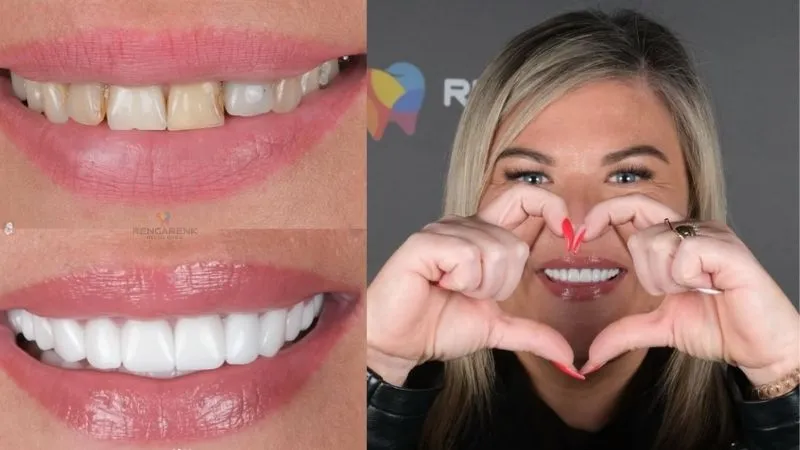How long do veneers last from Turkey?
If you're considering dental veneers to enhance your smile, you might be wondering: How long do veneers last? The answer depends on the material used and how well you care for them. On average, veneers can last anywhere from 5 to 15 years, but with the right habits, they can stay in excellent condition even longer.

Types of veneers
Dental veneers are manufactured from a variety of materials, each offering its own set of advantages. The most typical kinds:
- Porcelain veneers: These are the most durable option, typically lasting 10 to 15 years or more with proper care. They are highly resistant to stains and wear and highly natural-looking. These veneers mimic the translucency and texture of real teeth.
Includes types of Emax (lithium disilicate), Lumineers (ultra-thin porcelain), and zirconia (extremely strong and durable). They require minimal tooth preparation, and custom shells are bonded to the teeth.
- Composite Veneers: A more affordable alternative, composite veneers generally last 5 to 7 years before requiring replacement or touch-ups. Composite veneers come in different types based on how they are applied and the materials used, i.e., direct, indirect, and nano-hybrid. The best type of composite veneer depends on your budget, aesthetic goals, and how long you want them to last. If you need a quick and affordable option, direct composite veneers are ideal. If you're looking for better durability and aesthetics, indirect or nano-hybrid composite veneers may be the better choice.
The other types (no-prep, same-day, palatals) are generally a subcategory of these two. Each type of veneer has its own advantages, and the choice depends on factors like durability, cost, and the extent of tooth preparation required. Consulting with a dentist can help determine the best option for your needs.

What affects the longevity of your veneers?
To make the most of your dental veneer in Turkey, consider these key factors that influence veneer lifespan:
- The veneer material also affects the lifetime. Zirconium and Emax veneers Turkey are the longest-lasting veneers.
- Brushing, flossing, and regular dental check-ups are essential to maintain both your veneers and overall oral health.
- Avoiding hard or sticky foods, as well as stain-inducing drinks like coffee and red wine, helps preserve the pristine look of your veneers.
- Teeth grinding, nail-biting, or chewing on hard objects can weaken veneers over time. A nightguard can help protect against grinding-related damage.
- Routine dental visits to your dentist ensure that any minor issues are caught early, preventing costly repairs or replacements.
While veneers aren't permanent, they can be a long-term solution for achieving a flawless smile—if you take care of them properly. By choosing high-quality materials and adopting good oral habits, you can enjoy stunning results for years to come.
Thinking about transforming your smile with veneers? Book a consultation with us today! We will help you choose the best option to achieve your dream smile.
Dental veneers in terms of durability and lifetime
Emax Veneers
Material: Lithium disilicate ceramic.
Durability: Highly durable, resistant to chipping and cracking.
Lifespan: 10 to 20 years with proper care.
Key Features: Minimal tooth preparation, stain-resistant, and customizable for a natural appearance.
Zirconium veneers
Material: Zirconium dioxide, a super-strong ceramic.
Durability: Exceptionally strong.
Lifespan: Conventional zirconia lasts 5 to 7 years, but newer forms last more than 20 years, even though for now scientific and clinical data is lacking.
Lumineer
Material: Proprietary feldspathic porcelain (Cerinate or Cerinate 2).
Durability: Less durable than Emax or traditional porcelain due to ultra-thin design.
Lifespan: 5 to 15 years, with typical estimates around 5 to 10 years.
Key Features: Minimal to no tooth preparation, reversible in some cases, but less effective for masking severe discoloration or imperfections.
Porcelain Veneers
Material: High-quality dental porcelain.
Durability: Moderately durable and stain-resistant.
Lifespan: 10 to 15 years; studies show a survival rate of 95% at 10 years and 85% at 15 years.
Key Features: Perfect for masking major imperfections, it looks very natural due to its light-reflecting properties.
How long do veneers last - a comparison table:
|
Type |
Durability |
Lifespan |
Key Strengths |
|
Emax |
High |
10-20 years |
Minimal prep, stain-resistant, natural look |
|
Zirconia |
Very high |
15-30 years |
Extremely strong, suitable for bruxism |
|
Lumineers |
Moderate |
5-10 years |
Minimal prep, reversible, less invasive |
|
Porcelain |
High |
10-15 years |
Superior aesthetics, long-term durability |
Each type has its advantages, and the choice depends on factors like durability needs, aesthetic goals, and tooth preparation preferences.
How do I extend the life of my veneers?
To keep your veneers looking great and functioning well for as long as possible, consider these expert recommendations:
- Floss daily to remove plaque and food debris that could weaken the bond between your veneers and natural teeth.
- Avoid hard foods like ice, nuts, and hard candies, as they may cause veneers to chip or crack.Stay away from sticky foods such as caramel or chewing gum, which could loosen veneers over time.
- Reduce your intake of coffee, tea, red wine, and dark berries, as these can discolor veneers over time, avoid smoking.
- If you suffer from bruxism (teeth grinding), wear a custom-fitted nightguard while sleeping to prevent premature damage.
- See your dentist every six months for professional cleanings and to monitor the condition of your veneers. Catching potential issues early helps avoid costly repairs.
- Never use your teeth to open packaging, bite into hard objects, or chew non-food items, as this causes damage.
By following these simple yet effective care habits, you extend the life of your veneers, Antalya, and keep your smile looking beautiful for many years.
Would you like to learn more about getting veneers? Schedule a consultation today!
What happens to veneers after 15 years?
Veneers are designed to enhance your smile for years to come, but like any dental restoration, they don't last forever. Over time, some deterioration occurs due to dental care. Although veneers are generally resistant to discolouration, the colour of the veneer will change after many years. There are deformations on the edges of the veneers due to chewing. This is often seen in those who have teeth grinding problems. If a veneer is not made well, caries formation is observed under veneer.
Should You Replace Veneers After 15 Years?
After 15 years, if you think your veneers have reached the end of their life, you may need to replace them. If you notice cracks, chips, staining, or gum recession, you may want to consider replacement to maintain both aesthetics and functionality.

